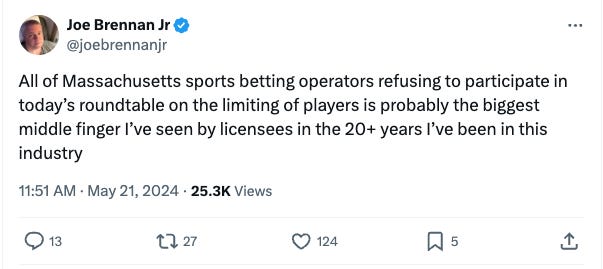Sportsbook Limits Get A Closer Look From Regulators
An overview of the Massachusetts Gaming Commission roundtable on sports betting limitations
Editor’s note: I have had less time to write in recent weeks, and Isaac graciously agreed to let me post this here. He has his own Substack and also recently wrote an opinion piece about sports betting at the Wall Street Journal. Enjoy.
Casinos make money by taking more from bettors than they give back. They do this in two ways: getting losing gamblers to place bets with lousy odds, and preventing skilled bettors from placing bets with good odds.
Today’s sportsbooks spend lots of time and resources weeding out skilled gamblers. Modern sports bettors want to gamble on everything from how many assists a player will have to what color the Gatorade bath at the Super Bowl will be, and sportsbooks facilitate that. But by “expanding their menu,” operators make themselves vulnerable to sharp bettors, who have more opportunities to pinpoint mispricings and place profitable wagers. To mitigate the risk from these patrons, sportsbooks closely monitor wagers and limit users’ bet size if they feel they’re likely to win in the long run.
To better understand how limiting works, the Massachusetts Gaming Commission (MGC) held a first-of-its-kind public roundtable this week. The goal was to bring together operators, bettors, and industry experts to inform regulators about what was happening at legal sportsbooks in the state. There was only one problem: every operator in Massachusetts declined to show up. (Bally’s, which has a license but isn’t active, sent a representative.)
Commissioners weren’t pleased. Natasha Skinner said the roundtable was “not a good use of our time,” while Brad Hill noted “there was a lot more information we could and should have gotten today.” Yet despite the lack of operators – or maybe because of it – attendees had a productive conversation and outlined some of what’s needed to help achieve “fundamental fairness” in the legal sports betting space.
What is limiting and how does it work?
To figure out which customers are likely to win, sportsbooks look at metrics such as closing line value (CLV), which tracks how much the odds shift in a bettor's favor. For example, if a patron wagers on the Red Sox when they’re underdogs but by gametime they’re favored, the bookmaker knows the bettor “beat the line” and got CLV. If this happens enough times, the sportsbook may limit the user.
Limits on most legal US sportsbooks are swift and strict. Once they’re identified as sharp, a patron may only be able to wager 10% of what a “fresh” account can. Operators often paint with a broad brush, limiting users in sports and markets they haven’t bet in and couldn’t beat.
Jack Andrews, co-founder of betting education site Unabated.com, told commissioners how DraftKings limited his account so severely that he was only able to bet $27 on whether or not the Super Bowl coin flip would be heads or tails. Experiences like these, explained Andrews, leave a sour taste in patrons’ mouths; especially when airwaves are flooded with advertisements from those same companies saying how anyone can win big.
Data, transparency and fairness
One thing all participants agreed on was that regulators needed more data about how many users were limited and why. Such information would show whether or not this practice is impacting a large number of users earnestly trying to win, or only a small subset of professionals.
Data on user limits would also allow regulators to protect Amercians with gambling problems, a higher priority than ensuring fairness for skilled bettors. Just as operators decrease limits for skilled bettors, they often increase limits for unskilled bettors. Transparency around betting limits would help policymakers understand these practices, what impacts user behavior, and what can be done to minimize the incidence and severity of addiction.
Operators, however, aren’t a fan of transparency when it comes to limiting. In letters explaining their absence, sportsbooks argued public conversations would necessarily divulge “trade secrets.” The commission disagreed. Interim Chair Jordan Maynard noted that while “it can be uncomfortable to have these conversations in public… transparency is key to integrity of the industry in Massachusetts.”
Moving forward
The press and attention surrounding Tuesday’s roundtable should encourage other regulators to follow the MGC and solicit information on how sportsbooks are treating patrons. Good policy starts with good data and informed policymakers, and the MGC has taken a key step in that direction.
Future meetings, however, need to clarify policymakers’ priorities, and what happens when priorities clash. For example, the MGC made clear their desire to stamp out unregulated gambling. But some Massachusetts legislators are pushing for higher taxes on operators, which would restrict the number of legal operators and push at least some customers into the unregulated market.
Regulators have (or at least should have) three main goals when it comes to sports betting: maximize tax revenue, decrease illegal gambling, and minimize problem gambling and the associated harms. Ensuring regular citizens are treated fairly and have access to an enjoyable sports betting experience is a distant fourth. Unfortunately, prioritizing all of these often isn’t possible. Until regulators clarify what they want and what they’re willing to sacrifice, conversations and policies will continue to pull in different directions, stalling real progress.
But hey, this was a good start.
The Closing Line is a publication of +More Media.
For sponsorship inquiries, contact me or email scott@andmore.media.








